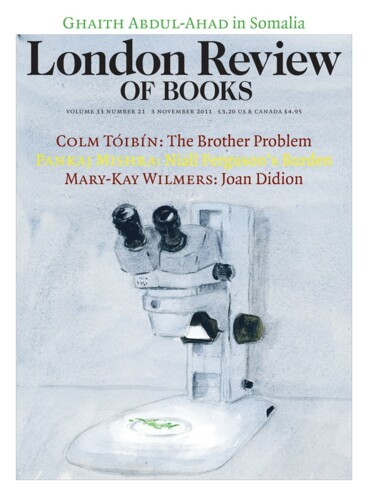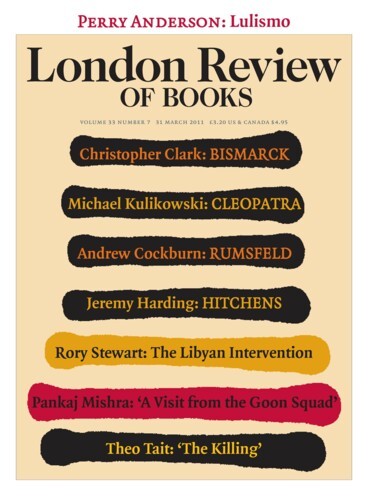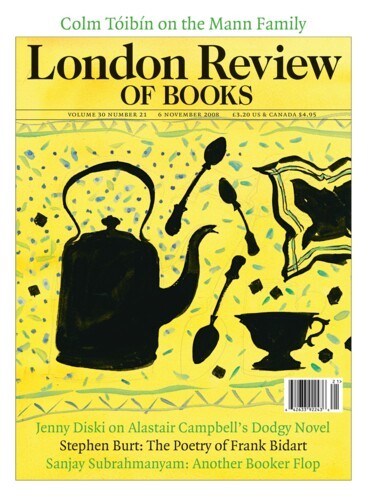Pankaj Mishra
Pankaj Mishra’s books include Age of Anger: A History of the Present; From the Ruins of Empire: The Intellectuals Who Remade Asia; two novels, the more recent of which is Run and Hide; and The World after Gaza, which is based on his 2024 LRB Winter Lecture, ‘The Shoah after Gaza’. He has also written for the paper on subjects including Niall Ferguson, liberalism, the misuse of human rights, Modi’s India and Germany’s commitment to Israel.
Watch this man: Niall Ferguson’s Burden
Pankaj Mishra, 3 November 2011
‘Civilisation’s going to pieces,’ Tom Buchanan, the Yale-educated millionaire, abruptly informs Nick Carraway in The Great Gatsby. ‘I’ve gotten to be a terrible pessimist about things. Have you read The Rise of the Colored Empires by this man Goddard? … The idea is if we don’t look out the white race will be – will be utterly submerged.’
Modernity’s Undoing: ‘A Visit from the Goon Squad’
Pankaj Mishra, 31 March 2011
‘America created the 20th century,’ Gertrude Stein wrote in The Autobiography of Alice B. Toklas, ‘and since all the other countries are now either living or commencing to be living a 20th-century life, America having begun the creation of the 20th century in the sixties of the 19th century is now the oldest country in the world.’ She meant, quite reasonably, that America was the oldest country in the world because it was the first to be modern. By 1933, Stein had already witnessed the industrialisation of America and the new technologies of standardisation and control unleashed by Fordism and Taylorism. Had she lived longer into the 20th century, one can only imagine what she would have made of the many organisation men, hidden persuaders and lonely crowds still to come, or of the other ideological prisons created by the national security state and the Cold War.
Hindi or Hinglish
6 November 2008
Rise of the Rest: After America
Pankaj Mishra, 6 November 2008
In 1946, George Kennan, then the deputy head of the US mission in Moscow, sent a 5300-word telegram to Washington, hoping to alert his superiors to the threat of Soviet expansionism. Kennan had complained repeatedly and fruitlessly about what he saw as America’s indulgent attitude towards the Soviet Union, but for a crucial moment in 1946 his idea that the US should strike an alliance with Western Europe in order to contain Soviet Communism found listeners in Washington. The so-called Long Telegram, subsequently turned into an article in Foreign Affairs, became the basis of the Truman Doctrine, which proclaimed America’s willingness to fight the spread of Communism, militarily as well as economically.
Podcasts & Videos
States of Shock
Pankaj Mishra and Adam Shatz
Pankaj Mishra talks to Adam Shatz about his latest piece for the LRB, which looks at the ways the US and UK have responded to the Covid-19 pandemic and Black Lives Matter protests, and what those botched...
Pieces about Pankaj Mishra in the LRB
Am I right to be angry? Superfluous Men
Malcolm Bull, 2 August 2018
In The Passions and the Interests, published in 1977, Albert Hirschman revisited the 18th-century argument that the pursuit of worldly self-interest might be the most effective way of...
Read anywhere with the London Review of Books app, available now from the App Store for Apple devices, Google Play for Android devices and Amazon for your Kindle Fire.
Sign up to our newsletter
For highlights from the latest issue, our archive and the blog, as well as news, events and exclusive promotions.



